Health and Cash and Voucher Assistance
Introduction to health in the humanitarian sector
Humanitarian crisis have a profound impact on the health and well-being of affected populations. The direct consequences of these crisis can lead to severe injuries and even death. Indirect consequences, resulting from poor living conditions, destruction of sources of livelihoods and health systems put these populations at risk of developing diseases. In light of these conditions, access to timely and appropriate care is crucial, particularly in the initial phase of crisis. The aim of health interventions within the humanitarian sector is “to reduce avoidable mortality, morbidity and disability, and restore the delivery of, and equitable access to, preventive and curative health care as quickly as possible and in as sustainable a manner as possible”. External support to mitigate the effects of a humanitarian crisis should as much as possible use and reinforce existing systems unless these systems are highly inefficient, become abused for political reasons or are unable to react to the excess health needs.
In the context of emergencies or crisis, health care systems should be supported and resorted. Many countries affected by humanitarian crises however have poorly developed health systems, which are then exacerbated by the crisis, with poor quality of care, interrupted supply lines and weak accessibility.
How is CVA used in the Health Sector?
Cash and voucher assistance (CVA) had been used to improve access and utilization of health services in humanitarian settings by reducing financial barriers to access to health services, as well as reducing direct and indirect financial barriers. When health services are available with adequate capacity and quality but user fees are applied, the preferred response option is through provider payment mechanisms, with CVA to be considered complementary to such supply side health financing strategies, and not aim to replace these.
In March 2018, the Global Health Cluster published a working paper for considering cash transfers for health in humanitarian settings. The paper discusses the potential added value and limitations of CVA to achieve health outcomes. It discusses the different types of cash transfer modalities complementary to health financing options, and alongside other response interventions to support access to quality services.
Possible interventions could include vouchers for reimbursement of costs of consultations, diagnostic tests and/or medicines, value voucher or cash for specific health services, drugs or associated indirect costs, or unconditional/unrestricted cash to compensate for funds lost on health care costs.
Key Resources
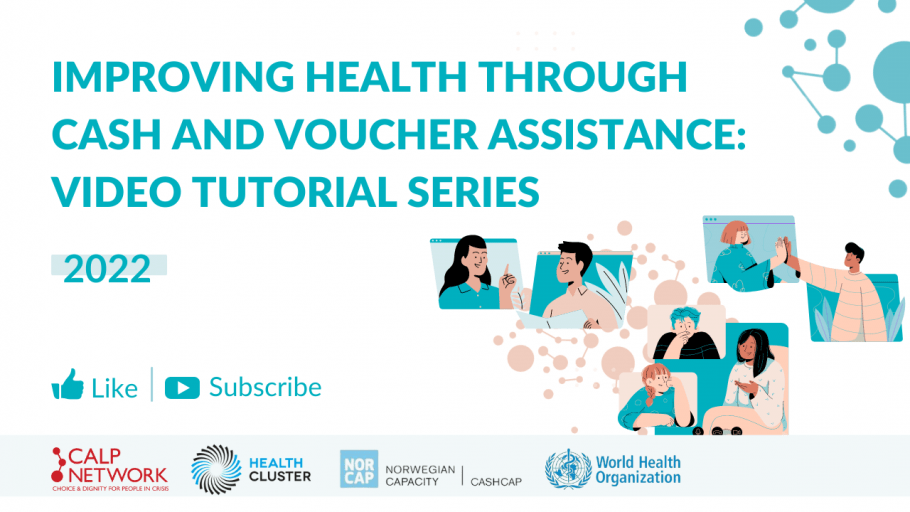
Improving Health Through Cash and Voucher Assistance: Video Tutorial Series
Video
The right to health for all people means that everyone should have access to the health services they need, when and where they need them, without suffering financial hardship.

Episode 7: How can we use cash and voucher assistance to support universal health goals?
Podcast
In episode 7, we discuss how health needs, and the provision of health services, in humanitarian response works and where using Cash and Voucher Assistance (CVA) may help. What we know already is that CVA may be used for health outcomes but giving cash via Multi-Purpose Cash Assistance (MPCA) via the Minimum Expenditure Basket (MEB) isn’t enough to meet health needs. We look at best...

CVA for Health Outcomes: From evidence to practice in MENA
Webinar
Wednesday, 2 June 2021, 15:00 AMM | 13:00 UK
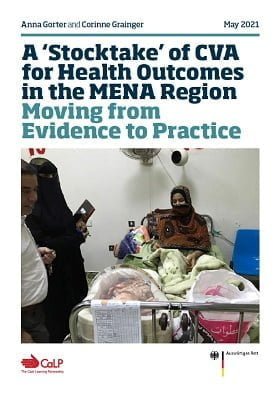
A ‘Stocktake’ of CVA for Health Outcomes in the MENA Region Moving from Evidence to Practice
Report
This report sets out the findings from a ‘stocktake’ or rapid operational research study of Cash and Voucher Assistance (CVA) for health outcomes in the Middle East and North Africa (MENA) region. Countries in this study are drawn from Cash Learning Partnership’s (the CALP Network) Tier 1 group of countries (Iraq, Jordan, Lebanon, Occupied Palestinian Territories (OPT), Syria, Turkey and...
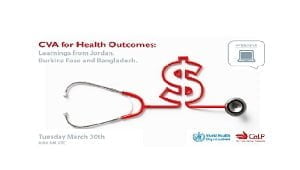
CVA for Health Outcomes: Learnings from Jordan, Burkina Faso and Bangladesh
Webinar recording
How can Cash and Voucher Assistance (CVA) support the goal of improved health outcomes in conditions of extreme poverty and vulnerability? During this webinar, we shared learning from three programmes that used cash and vouchers to improve access to and utilization of health services. This was achieved by either by reducing direct and indirect financial barriers, and/or by...

CVA and health: Case studies from Jordan, Burkina Faso and Bangladesh
Collection
How can Cash and Voucher Assistance (CVA) support the goal of improved health outcomes in conditions of extreme poverty and vulnerability? These three case studies present findings from Bangladesh, Burkina Faso and Jordan. All three programmes used cash and vouchers to improve access to and utilization of health services, either by reducing direct and indirect financial barriers, and/or by...

Inclusion of Health Expenditures in the MEB
Guidelines and Tools
Technical note from the Global Health Cluster on methods to include health expenditures in the minimum expenditure basket. The note is meant for cash and cash practitioners alike, working together during the design of the MEB to ensure the health portion is reflected – as it is almost always reported as an expenditure. Within the note three methods are proposed to determining the health...

Cash and Voucher Assistance for Health
Report
Evidence is slowly emerging on the use of cash and voucher assistance (CVA) to reach health outcomes. The key entry point for CVA in
health is the strategy Healthcare 2030, which aims at Universal Health Coverage (UHC) and access to healthcare when people need it without inducing financial hardships CVA can be useful to improve access to and utilization of health services in humanitarian...

Interim Guidance note on the role of Cash and Voucher Assistance to reduce financial barriers in the response to the COVID-19 pandemic, in contexts targeted by the Global Humanitarian Response Plan COVID-19
Guidelines and Tools
This paper provides general guidance on identifying financial barriers, and considering supply side financing options and complementary CVA within the broader response interventions to Covid-19.

Cash and Voucher Assistance for Health Outcomes
Webinar recording
The Global Health Cluster, the CALP Network, CARE, IRC and KIT organized a webinar on CVA for health outcomes. The aim of the webinar was to enhance participants’ learning of the use of CVA to address financial barriers to healthcare and improve access to Health with research and projects to date. The agenda was adapted to reflect the COVID-19 situation and provide some considerations for...
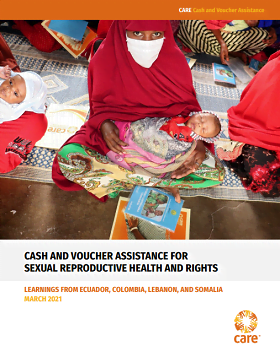
Cash and voucher assistance for sexual reproductive health and rights learnings from Ecuador, Colombia, Lebanon, and Somalia
Report
CARE is committed to ensuring that projects with cash and voucher assistance (CVA) are designed with and for women and girls, addressing recipients’ needs, challenges, and opportunities. CARE has invested in research on how to make CVA work for women and girls through gender-sensitive approaches to framing processes and outcomes of the modalities. As a widely accepted method of increasing...

Guidelines on Using Cash and Voucher Assistance for Sexual and Reproductive Health and Rights Programming
Guidelines and Tools
CARE seeks to increase its use of CVA for one of its core areas of programming, Sexual and Reproductive Health and Rights (SRHR). This is in line with the recommendations of the Inter-Agency Working Group on Reproductive Health, which deems CVA a suitable option to ensure ongoing access to affordable and high-quality comprehensive sexual and reproductive health (SRH) care. In 2020, CARE...
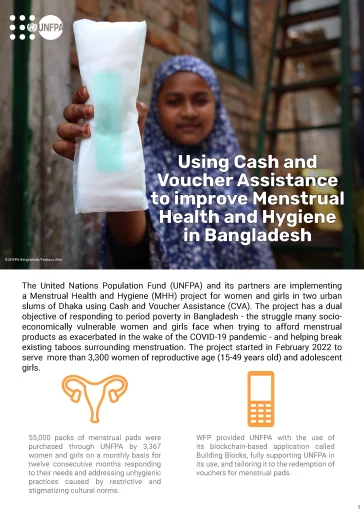
Using Cash and Voucher Assistance to improve Menstrual Health and Hygiene in Bangladesh
Case Study
The United Nations Population Fund (UNFPA) and its partners are implementing a Menstrual Health and Hygiene (MHH) project for women and girls in two urban slums of Dhaka using Cash and Voucher Assistance (CVA). The project has a dual objective of responding to period poverty in Bangladesh – the struggle many socio-economically vulnerable women and girls face when trying to afford menstrual...
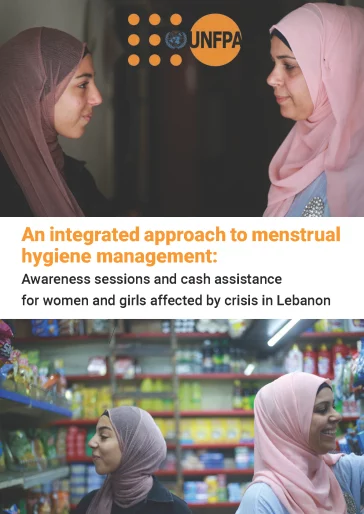
An Integrated Approach to Menstrual Hygiene Management: Awareness sessions and cash assistance for women and girls affected by crisis in Lebanon
Case Study
In 2022, UNFPA Lebanon worked with local partners to launch an integrated cash and awareness for menstrual hygiene management (MHM) initiative as a way to tackle the growing issue of period poverty amidst the country’s economic crisis. Through the pilot, over 2,600 vulnerable women and girls of reproductive age received cash assistance intended to cover the purchase of monthly menstrual...
More from around the web
-
UNHCR: Cash for Health: Key Learnings From a Cash for Health Intervention in Jordan
-
UNHCR: Cash-Based Interventions for Health Programmes in Refugee Settings- A Review
-
WHO: Health Financing Policy and Implementation in Fragile and Conflict-Affected Settings: Synthesis of Evidence and Policy Recommendations
Latest on health

Mejora de la salud a través de los programas de transferencias monetarias: serie de tutoriales en video
Publication
El derecho a la salud significa que todas las personas deben tener acceso a los servicios de salud que necesitan, cuándo y dónde los necesitan, sin sufrir dificultades financieras.
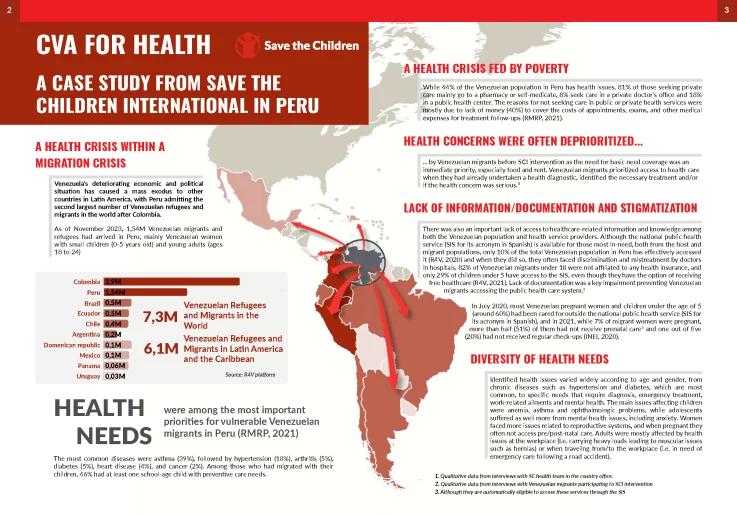
Cash & Voucher Assistance (CVA) for Health Outcomes: a case study in Peru
Case Study
This case study is drawn from Save the Children CVA operations in Peru between 2021 and 2023, focusing on the achievement of health outcomes for vulnerable Venezuelan migrants.
Following an overview of the contexts and of the needs, it deep dives into the technical design of the integrated program, notably how a CVA for Health component was introduced. It continues with a presentation of...

Locally Led Anticipatory Action Guide and Toolkit
Guidelines and Tools
How civil society organisations can engage with communities, and collaborate with mandated, technical and donor agencies to localise and scale up early warning and early action
The purpose of the guide is to support civil society organisations to engage with communities and other actors and structures at the local level; to play a central role in planning and establishing local mechanisms...

Addressing Negative Socioeconomic Impacts of the COVID-19 Pandemic through Social Protection in Viet Nam – Supporting incomes and livelihoods with cash assistance in Dong Nai province
Case Study
In late April 2021, Viet Nam faced its fourth wave of COVID-19, with over 895 000 new cases reported. COVID-19 and related restrictions hindered livelihood options and vulnerable households faced financial stress to cover basic needs. Some of them lost their income and were unable to return to home villages for a certain period of time. In addition, many people living in vulnerable...
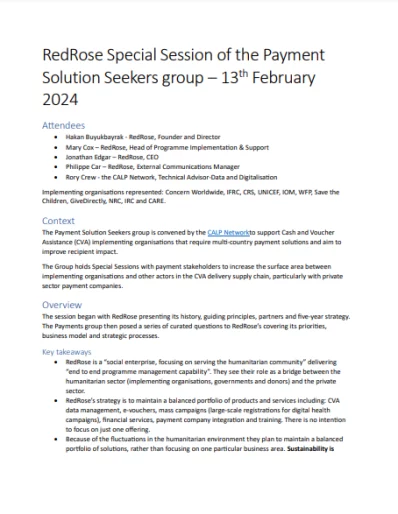
RedRose presentation to Payments group – Notes, 13th February 2024
Meeting minutes
These meeting notes give details to the Special Session held with RedRose on 13th February 2024, hosted by the Payments group.
The session began with RedRose presenting on its history, guiding principles, partners and five-year strategy. The group then posed a series of curated questions to understand RedRose’s priorities, business model and strategic processes.
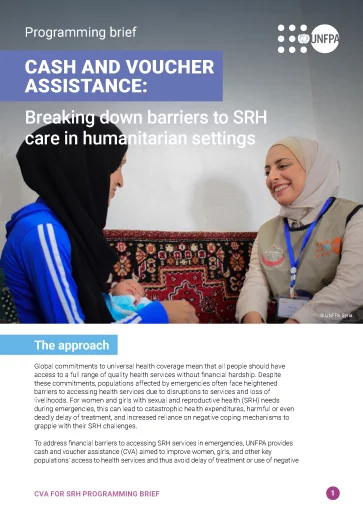
Cash and Voucher Assistance: Breaking down barriers to SRH care in humanitarian settings
Case Study
Global commitments to universal health coverage mean that all people should have access to a full range of quality health services without financial hardship. Despite these commitments, populations affected by emergencies often face heightened barriers to accessing health services due to disruptions to services and loss of livelihoods. For women and girls with sexual and reproductive health...

Community Insight Survey for Cash-Based Programs in Afghanistan
Case Study
The Community Insight Survey for Cash-Based Programs by iMMAP Inc. in Afghanistan provides critical insights into the effectiveness of cash-based humanitarian assistance in the country. Conducted across diverse regions of Afghanistan, the survey highlights the positive impact of cash assistance on household well-being, while also identifying significant gaps in meeting basic needs,...

Payment Solution Seekers Webinar
Webinar recording
This webinar marked the launch of the Payment solutions for CVA implementers report; which helps implementing organizations, payment companies and regulators leverage FinTech innovations to increase the impact of Cash and Voucher Assistance (CVA).

Understanding how Cash and Voucher Assistance Programs for Nutrition are Implemented: A review of programmatic case examples from Burkina Faso, Mali, Niger, Somalia, and Colombia
Report
The purpose of this review was to identify and document case examples of programs in different countries and contexts that use cash, vouchers, or in-kind food assistance with nutrition activities to understand why and how these programs are implemented, and identify innovations that may inform and support the Supplemental Nutrition Assistance subsector programming of USAID’s Bureau for...


